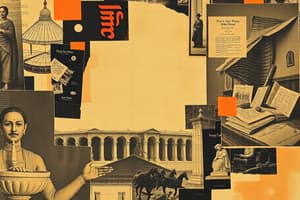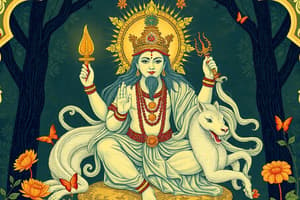Podcast
Questions and Answers
During which period of time was Hindi literature primarily poetic and orally transmitted?
During which period of time was Hindi literature primarily poetic and orally transmitted?
- Medieval Period (10th Century – 16th Century)
- Golden Period (20th Century)
- Modern Period (19th Century – Present)
- Classical Period (4th Century – 19th Century) (correct)
Which literary works were originally composed in Sanskrit but later translated into vernacular languages like Braj Bhasha?
Which literary works were originally composed in Sanskrit but later translated into vernacular languages like Braj Bhasha?
- _Panchatantra_ and _Hitopadesha_
- _Ramayana_ and _Mahabharata_ (correct)
- _Bhagavad Gita_ and _Upanishads_
- _Arthashastra_ and _Kamasutra_
Which poetic genre spread the teachings of Hinduism using simple language and emphasized devotion to a personal God?
Which poetic genre spread the teachings of Hinduism using simple language and emphasized devotion to a personal God?
- Epic poetry
- Metaphysical poetry
- Bhakti poetry (correct)
- Sonnets
Who are considered prominent figures of the Classical Period of Hindi literature?
Who are considered prominent figures of the Classical Period of Hindi literature?
Which literary giants played a crucial role in transitioning Hindi literature from oral tradition to written works?
Which literary giants played a crucial role in transitioning Hindi literature from oral tradition to written works?
Which period marked the standardization and promotion of Hindi in literature by literary figures like Banarasidas Chaturvedi?
Which period marked the standardization and promotion of Hindi in literature by literary figures like Banarasidas Chaturvedi?
Which poetic movement influenced Hindi poetry during a certain era?
Which poetic movement influenced Hindi poetry during a certain era?
Who is known for introducing free verse and symbolism in Hindi poetry?
Who is known for introducing free verse and symbolism in Hindi poetry?
Which novelist was noted for his socially conscious narratives in Hindi literature?
Which novelist was noted for his socially conscious narratives in Hindi literature?
Who are notable authors in the field of Hindi literary criticism?
Who are notable authors in the field of Hindi literary criticism?
Which language has Hindi literature been translated into?
Which language has Hindi literature been translated into?
Who is known for shaping Hindi drama through their works?
Who is known for shaping Hindi drama through their works?
Flashcards are hidden until you start studying
Study Notes
Unraveling Hindi's Rich Literary Heritage
Hindi, a language with a vast and ancient history, is also home to a rich and diverse literary tradition. A multitude of poets, novelists, dramatists, and thinkers have contributed to the development of Hindi literature, enriching it with their unique perspectives and styles. Let's explore some of its most profound aspects.
Classical Period (4th Century – 19th Century)
During this era, Hindi literature was primarily poetic and orally transmitted, with the earliest works including the Ramayana and Mahabharata, which were composed in Sanskrit but later translated into vernacular languages such as Braj Bhasha, a predecessor of modern Hindi. The 16th and 17th centuries saw the rise of Bhakti poetry, which spread the teachings of Hinduism through the use of simple language and emphasized devotion to a personal God. Poets like Surdas, Tulsidas, and Jaidev wrote beautiful verses in Hindi and are considered among the most prominent figures of this period.
Modern Period (19th Century – Present)
In the 19th century, Hindi literature transitioned from a purely oral tradition to one with written works. This shift was catalyzed by the efforts of literary giants like Banarasidas Chaturvedi, Goswami Kaviraj, and Mahavir Prasad Dwivedi, who strived to standardize Hindi and promote its use in literature.
Hindi Poetry
Hindi poetry of this era was highly influenced by the Romantic Movement, seen in the works of celebrated poets like Mahadevi Verma (1907-1987), Suryakant Tripathi "Nirala" (1896-1961), and Sumitranandan Pant (1920-1977). These poets experimented with new forms and themes, breaking away from traditional styles and introducing free verse and symbolism.
Hindi Novels
Hindi novels emerged during the 19th century as well, with pioneers like Munshi Premchand (1880-1936) leading the way. Premchand was known for his realistic and socially conscious narratives, often dealing with the struggles of the lower classes and the complexities of Indian society. Other notable authors of this time include Raja Rao (1908-2006), Khushwant Singh (1915-2014), and Uday Prakash (born 1956).
Hindi Drama
Hindi drama has a relatively shorter history than poetry and prose. However, it has a rich tradition, particularly in the works of Mahesh Elkunchwar (born 1943) and Vijay Tendulkar (1928-2008). Their plays often tackle complex social issues and have been influential in shaping the genre.
Hindi Literary Criticism
Hindi literature has also seen the rise of literary criticism, with scholars like E.M. Forster (1879-1970), Vishwanath Prasad Tiwari (1885-1955), and Shiv K. Kumar (born 1932) contributing to the field. These thinkers have helped to analyze and understand the rich literary heritage of Hindi, shedding light on its unique characteristics and contributions to global literature.
Hindi Literature in Translation
Hindi literature has been translated into various languages, including English, French, German, and Chinese. These translations have introduced Hindi literature to a global audience and have helped to promote cross-cultural understanding. Notable translators include Arthur W. Ryder (1862-1944), Andre Padoux (1918-2008), and Stephen C. Phillips (born 1944).
Conclusion
Hindi literature, with its rich history and diverse traditions, remains a vibrant and dynamic force in the world of literature. From the classical works of the Bhakti poets to the contemporary novels of Uday Prakash, Hindi literature continues to captivate readers with its unique perspectives, complex characters, and profound insights into the human experience. Whether it be in poetry, prose, drama, or criticism, Hindi literature has much to offer, and its contributions to global literature are sure to endure for generations to come.
Studying That Suits You
Use AI to generate personalized quizzes and flashcards to suit your learning preferences.




